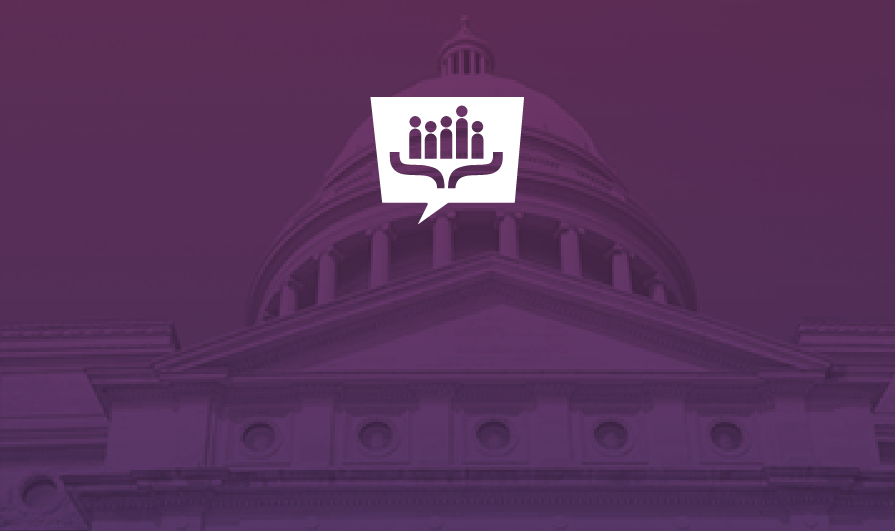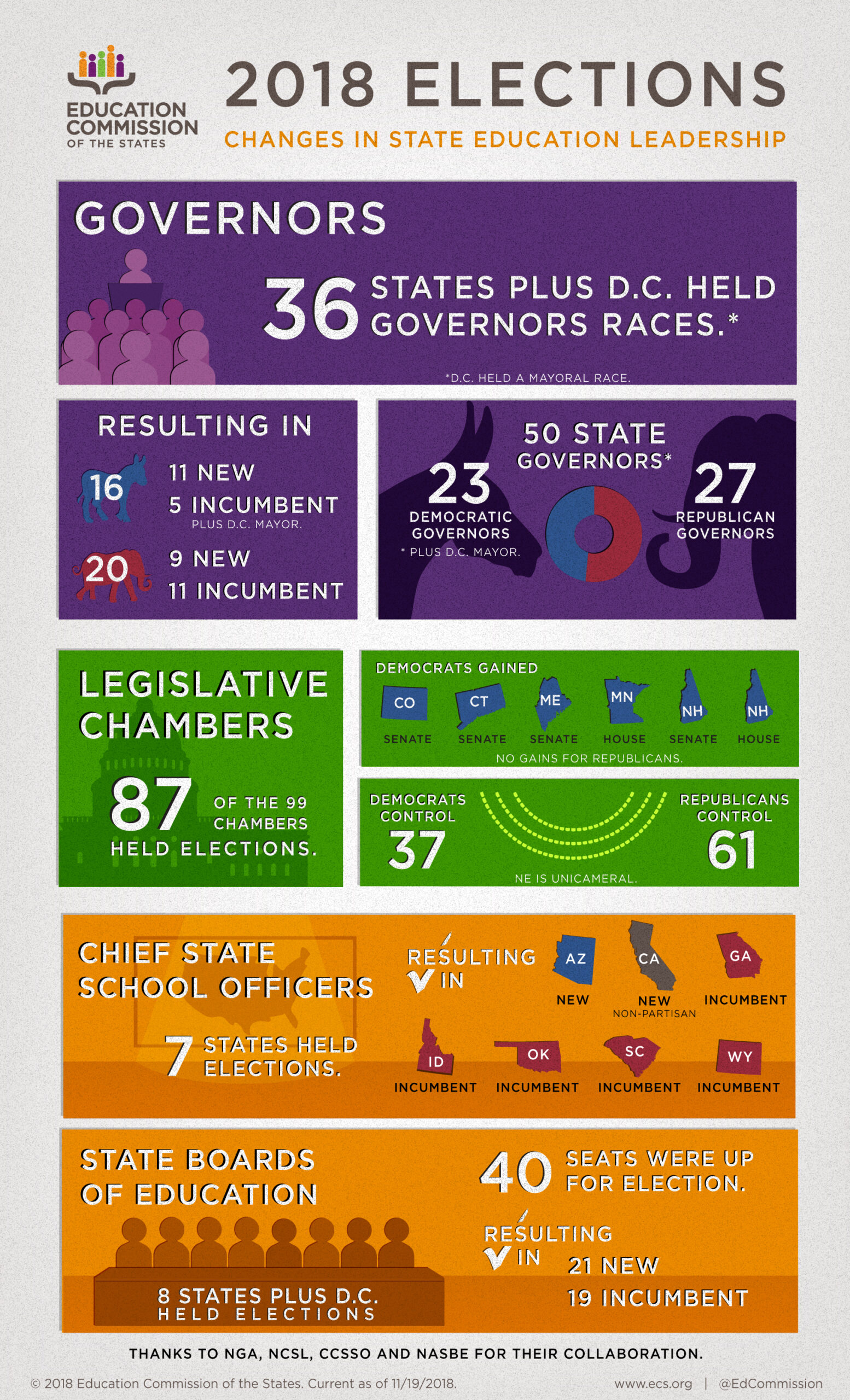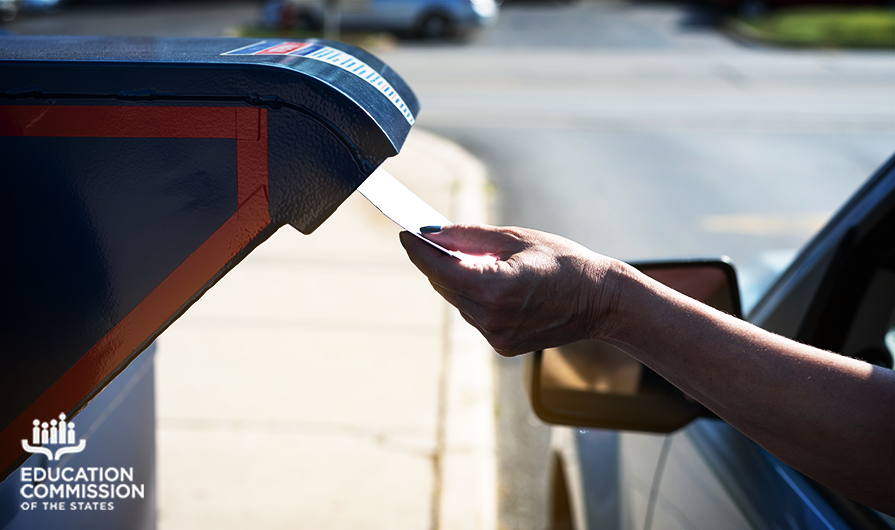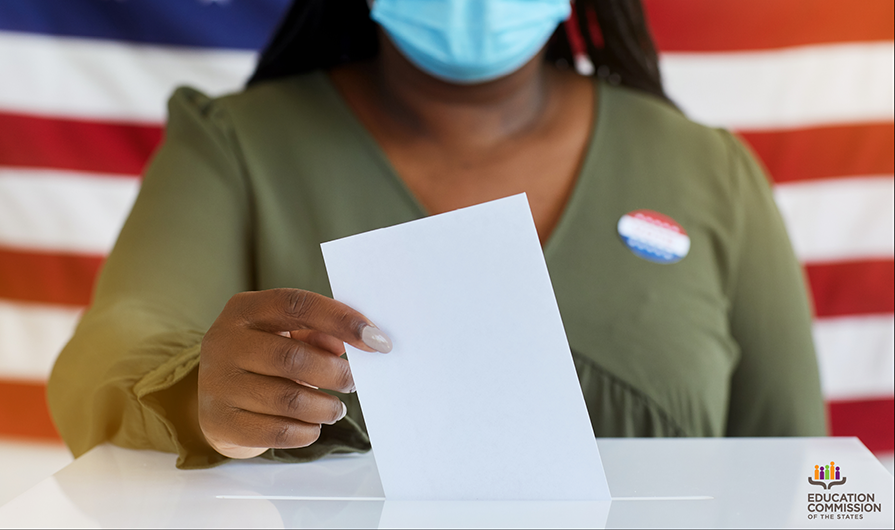UPDATED 11/19.
This is one of two posts on the 2018 elections results. See the other post, “2018 Elections: Top Education Takeaways.”
As expected, the elections this week brought changes to policy leadership across the states. With 20 new governors, two new state education chiefs, 21 new state board of education members and many new state legislators, we can expect quite a few new faces around the public policy table in 2019. Each of these elected officials play a unique role in shaping state education policy, and we will be working to support their goals for education in 2019 and beyond.
Here’s a deeper look at the changes seen this week.
Governors. Of the 36 governors races, 20 will be new to their position and the other 16 will be returning to their post. Republicans secured 20 of the 36 governor’s seats (with 11 incumbents and nine new governors), and Democrats secured 16 governor’s seats (with five incumbents and 11 new governors).
Many of these governors have the authority to appoint top education policy leaders in their state: Of the 36 states that held gubernatorial elections, 12 states authorize the governor to appoint the state education chief, seven authorize the governor to appoint the state higher education officer and 25 allow the governor to appoint members of the state education board.
[expand title="Gubernatorial Results" expanded="true"]
- Alabama – Kay Ivey, Republican / Incumbent
- Alaska – Mike Dunleavy, Republican / New
- Arizona – Doug Ducey, Republican / Incumbent
- Arkansas – Asa Hutchinson, Republican / Incumbent
- California – Gavin Newsom, Democrat / New
- Colorado – Jared Polis, Democrat / New
- Connecticut – Ned Lamont, Democrat / New
- Florida – Ron DeSantis, Republican / New
- Georgia – Brian Kemp, Republican / New
- Hawaii – David Ige, Democrat / Incumbent
- Idaho – Brad Little, Republican / New
- Illinois – J.B. Pritzker, Democrat / New
- Iowa – Kim Reynolds, Republican / Incumbent
- Kansas – Laura Kelly, Democrat / New
- Maine – Janet Mills, Democrat / New
- Maryland – Larry Hogan, Republican / Incumbent
- Massachusetts – Charlie Baker, Republican / Incumbent
- Michigan – Gretchen Whitmer, Democrat / New
- Minnesota – Tim Walz, Democrat / New
- Nebraska – Pete Ricketts, Republican / Incumbent
- Nevada – Steve Sisolak, Democrat / New
- New Hampshire – Chris Sununu, Republican / Incumbent
- New Mexico – Michelle Lujan Grisham, Democrat / New
- New York – Andrew Cuomo, Democrat / Incumbent
- Ohio – Mike DeWine, Republican / New
- Oklahoma – Kevin Stitt, Republican / New
- Oregon – Kate Brown, Democrat / Incumbent
- Pennsylvania – Tom Wolf, Democrat / Incumbent
- Rhode Island – Gina Raimondo, Democrat / Incumbent
- South Carolina – Henry McMaster, Republican / Incumbent
- South Dakota – Kristi Noem, Republican / New
- Tennessee – Bill Lee, Republican / New
- Texas – Greg Abbott, Republican / Incumbent
- Vermont – Phil Scott, Republican / Incumbent
- Wisconsin – Tony Evers, Democrat / New
- Wyoming – Mark Gordon, Republican / New
[/expand]
Elected State Education Chiefs. Seven states held elections for chief state school officers. The chief state school officer is a partisan role in six of these states, and Republicans have secured five of these positions.
[expand title="Elected State Education Chief Results"]
- Arizona – Kathy Hoffman, Democrat / New
- California – Tony Thurmond, Nonpartisan / New
- Georgia – Richard Woods, Republican / Incumbent
- Idaho – Sherri Ybarra, Republican / Incumbent
- Oklahoma – Joy Hofmeister, Republican / Incumbent
- South Carolina – Molly Spearman, Republican / Incumbent
- Wyoming – Jillian Balow, Republican / Incumbent
[/expand]
Elected State Board of Education Members. Eight states plus the District of Columbia held elections for 40 state board of education members. Overall, 21 new members were elected — Republicans secured seven seats, Democrats secured three seats and 11 seats are held by nonpartisan representatives. Incumbents secured 19 of the seats that were up for election.
State Legislatures. Of the 99 legislative chambers across the country (Nebraska is unicameral), 87 held elections. This translates to 46 states that held legislative races; the remaining four (Louisiana, Mississippi, New Jersey and Virginia) will hold their regular legislative elections in odd-numbered years. Republicans now control 61 state chambers and Democrats control 37, according to the National Conference of State Legislatures.
Only one state, Minnesota, will have a split legislature going into 2019. The last time there was only one divided state legislature was more than 100 years ago, according to NCSL.
Two states, Alaska and New York, had technical changes to party control in their legislative chambers. After the election, the Democrats won both numerical and functional control of New York Senate. Before the election, a Republican-led coalition held power. The reverse occurred in the Alaska House, where the Republicans now hold numerical and functional control of the chamber. Before the election, a small group of Republicans had allied with the Democrats to lead the chamber, according to NCSL.
Additionally, there are changes in states with government trifectas (where one political party controls both legislative branches and the executive office). After the election, there are Republican trifectas in 22 states, Democratic trifectas in 14 states, and 14 states are divided or unicameral.
For more information on legislative election results, check out StateVote from NCSL.











